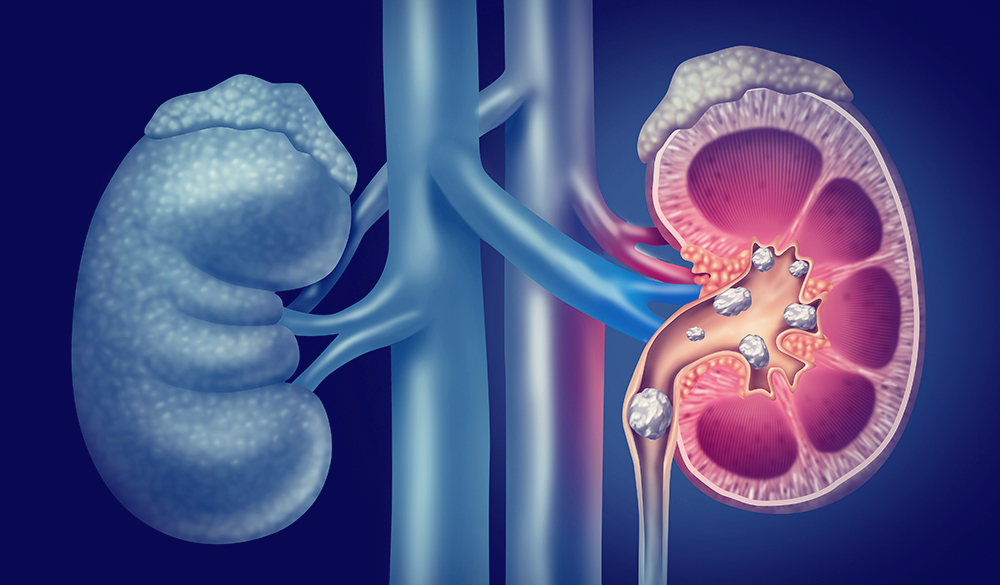Kidney stone disease is increasing, and stones are associated with considerable comorbidities including cardiovascular disease.[1] Preventative measures, including the intake of nutrients such as vitamins B6, B9, B12, K2, magnesium and potassium are important considerations to ensure this prevalence is minimised.
Kidney stones are formed in the body when there are elevated levels of urinary solutes including uric acid, oxalate, sodium and calcium.[2] Decreased citrate and magnesium, abnormally high or low urinary pH and low urinary volume all attributed to urolithiasis.[2] The result of this culmination of causative factors is urine supersaturation with stone-forming salts, and in turn, kidney stone formation.[2]
High levels of uric acid (hyperuricaemia) can induce or worsen existing cardiovascular disease (CVD), which in itself is a contributing factor to the advancement of renal disease.[3]
Homocysteine is a sulfur-containing amino acid which is biosynthesised from methionine. Increased levels of homocysteine in the blood (hyperhomocysteinaemia) are associated with an increased risk of both cardiovascular disease and impaired renal function, as well as a range of other chronic diseases.[4]
Vitamins B6, B9 and B12 can be of assistance in reducing homocysteine levels via transformative methylation processes and/or resultant histamine metabolism.[5] These vitamins are thus important considerations for both kidney health and associated CVD.
Vitamin B6, at a dose of 10 to 100mg daily, may also contribute to a reduction in kidney stones as it is essential for the metabolism of oxalic acid.[2] Alongside magnesium oxide, B6 has been shown to reduce recurrent the risk for calcium oxalate stone formation.[6]
Additionally, a long-term study over three years in 247 patients with recurrent idiopathic hypocitraturia (with or without hyperuricosuria) found that prophylaxis with potassium citrate, magnesium citrate and vitamin B6 every eight hours was beneficial in reducing the recurrence of calcium oxalate and phosphate urolithiasis.[7]
Vitamin B9 (folic acid) is useful for uric acid stones,[2] as it has demonstrated effectiveness in reducing uric acid levels, alongside enalapril, a medication often prescribed for those with both kidney health challanges and CVD.[8,9]
Finally, vitamin K2 may be useful for kidney disease as deficiency is common in patients undergoing haemodialysis, which is significantly correlated with vascular calcification. Research exhibits a reduction in this deficiency and in turn, a decrease in vascular calcification and mortality with the administration of the menaquinone-7 (MK-7) form of vitamin K2.[10,11]
Vitamin K2 can contribute to renal vascular health and may potentially reduce calcification which contributes to kidney stones, according to recent, promising research.[12]
References
- Gul Z, Monga M. Medical and dietary therapy for kidney stone prevention. Korean J Urol 2014;55(12):775-779. [Full Text]
- IM Gateway. Urolithiasis. [Source]
- Usharani P, Nutalapati C, Pokuri VK, et al. A randomized, double-blind, placebo-, and positive-controlled clinical pilot study to evaluate the efficacy and tolerability of standardized aqueous extracts of Terminalia chebula and Terminalia bellerica in subjects with hyperuricemia. Clin Pharmacol 2016;8:51-59 [Full Text]
- Fan R, Zhang A, Zhong F. Association between homocysteine levels and all-cause mortality: a dose-response meta-analysis of prospective studies. Sci Rep 2017;7(1):4769. [Abstract]
- Martí-Carvajal AJ, Solà I, Lathyris D, et al. Homocysteine lowering interventions for preventing cardiovascular events. Cochrane Database Syst Rev 2009;(4):CD006612. [Abstract]
- Rattan V, Sidhu H, Vaidyanathan S, et al. Effect of combined supplementation of magnesium oxide and pyridoxine in calcium-oxalate stone formers. Urol Res 1994;22(3):161-165.[Abstract]
- Reddy S, Shaik AB, Bokkisam S. Effect of potassium magnesium citrate and vitamin B-6 prophylaxis for recurrent and multiple calcium oxalate and phosphate urolithiasis. Korean J Urol 2014;55(6):411-416.[Full Text]
- Li H, Qin X, Xie D, et al. Effects of combined enalapril and folic acid therapy on the serum uric acid levels in hypertensive patients: a multicenter, randomized, double-blind, parallel-controlled clinical trial. Intern Med 2015;54(1):17-24.[Abstract]
- Qin X, Li Y, He M, et al. Folic acid therapy reduces serum uric acid in hypertensive patients: a substudy of the China Stroke Primary Prevention Trial (CSPPT). Am J Clin Nutr 2017;105(4):882-889.[Abstract]
- Caluwé R,Vandecasteele S,VanVlem B,et al.Vitamin K2 supplementation in haemodialysis patients: a randomized dose-finding study. Nephrol Dial Transplant 2014;29(7):1385-1390[Abstract]
- Aoun M, Makki M, Azar H,et al. High dephosphorylated-uncarboxylated MGP in hemodialysis patients: riskfactors and response to vitamin K2, a pre-postintervention clinical trial. BMC Nephrol 2017;18(1):191.[Abstract]
- Wei FF, Thijs L, Zhang ZY, et al.The risk of nephrolithiasisis causally related to inactive matrix Gla protein, a marker of vitamin K status: a Mendelian randomization study in a Flemish population. Nephrol Dial Transplant 2018;33(3):514-522.[Abstract]
DISCLAIMER:
The information provided on FX Medicine is for educational and informational purposes only. The information provided on this site is not, nor is it intended to be, a substitute for professional advice or care. Please seek the advice of a qualified health care professional in the event something you have read here raises questions or concerns regarding your health.



